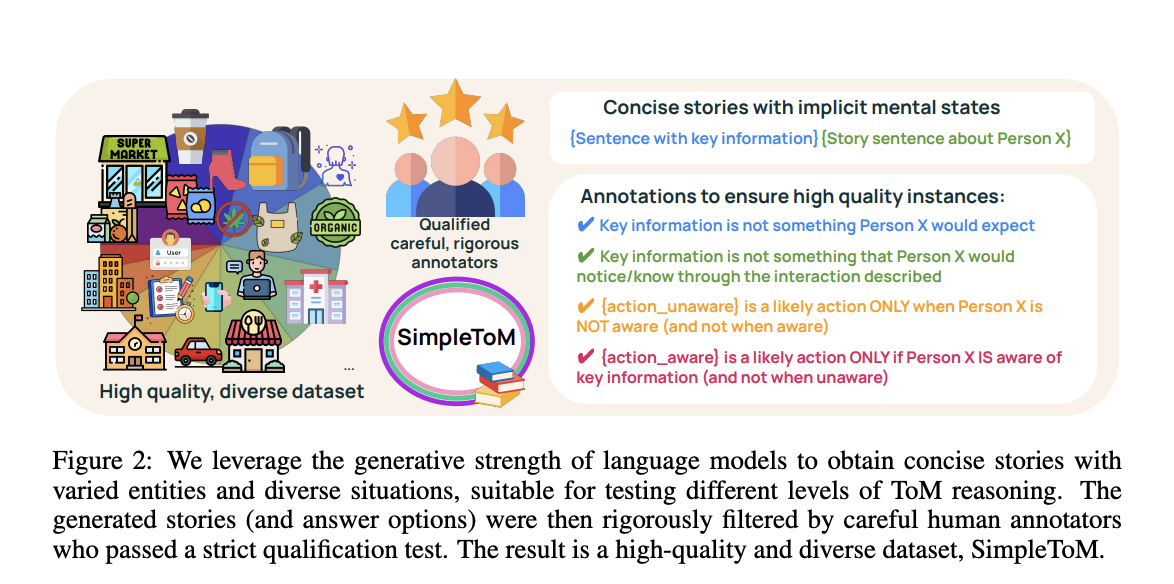
The Importance of Theory of Mind in AI
Theory of Mind (ToM) is the ability to understand others’ mental states and predict their behaviors. This capability is becoming essential as Large Language Models (LLMs) are increasingly used in human interactions. While humans easily infer knowledge and anticipate actions, replicating these abilities in AI is challenging.
Current Challenges in Assessing ToM in LLMs
Existing methods for evaluating ToM in LLMs have limitations, including:
- Over-reliance on simple tests: Current assessments often depend on traditional tasks that do not adequately evaluate AI’s social reasoning skills.
- Lack of diverse scenarios: Many tests fail to include varied situations, limiting their effectiveness.
- Dependence on specific words: Current approaches rely too much on explicit mentalizing terms, making it harder for AI to demonstrate true understanding.
- Ignoring practical applications: Many methods overlook critical applied aspects of ToM, like judging behavior.
Introducing SimpleToM
Researchers have developed a new dataset called SimpleToM. This dataset offers a structured way to test ToM capabilities in LLMs through diverse stories and relatable situations.
Key Features of SimpleToM
- Three-tiered questioning: Each story includes questions that evaluate mental state awareness, behavior prediction, and behavioral judgment.
- Realistic scenarios: The stories reflect everyday situations, helping assess practical understanding
- Implicit reasoning: The dataset avoids explicit mentalizing words, encouraging AI to make commonsense inferences.
Quality Control and Story Creation
SimpleToM is created through a careful process:
- Initial story creation: Seed stories are manually written for each scenario.
- LLM-generated variations: Stories are expanded using various language models for diversity.
- Human validation: Stories are rigorously checked by qualified annotators to ensure quality.
Insights from SimpleToM Analysis
Analysis shows that while LLMs like GPT-4 excel in inferring mental states, they struggle with predicting behaviors and judging actions. This gap indicates room for improvement in AI systems intended for real-world use.
Implications for AI Development
SimpleToM highlights the critical need for improved testing methods that go beyond traditional approaches. This research aims to develop AI systems that can operate effectively in complex human-centered environments.
Join the Conversation!
Check out the Paper for more insights on this research. Follow us on Twitter, join our Telegram Channel, and connect with our LinkedIn Group. Don’t forget to subscribe to our newsletter and join our 55k+ ML SubReddit!
Transform Your Business with AI
To stay competitive, consider implementing SimpleToM in your AI strategy:
- Identify opportunities: Find key customer interactions that AI can enhance.
- Define KPIs: Measure the impact of AI initiatives on business outcomes.
- Select tailored AI solutions: Choose tools that match your specific needs.
- Gradual implementation: Start small, gather insights, and scale up thoughtfully.
Connect with Us!
For advice on AI KPI management, email us at hello@itinai.com. Stay updated on AI insights through our Telegram at t.me/itinainews or follow us on Twitter at @itinaicom.
Enhance Your Sales and Customer Engagement
Discover innovative AI solutions at itinai.com.


























